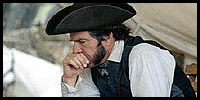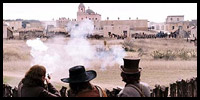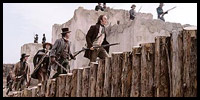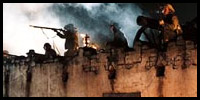
 |
|
The Alamo (2004) Cast: Billy Bob Thornton, Jason Patric, Dennis Quaid, Patrick Wilson, Emilio Echeverria, Jordi Molla, Leon Rippy, Kevin Page, Marc Blucas, Laura Clifton, W. Earl Brown, Matt O'Leary, Wes Studi 2004 – 138 minutes Rated: Reviewed by Dustin Putman, April 10, 2004.  Perhaps the soft MPAA rating was the first sign that trouble was afoot. Or maybe it was the sudden change in release dates from the lucrative Christmas and Oscar season to the middle of April. Either way, the battle of the Alamo has been called the most deadly showdown in Texas history, and this big-budget wannabe epic adaptation has been hacked and trimmed down to a PG-13 rating. If such censorship shows an unfortunate preference in box office earnings over historical realism, at least it is fitting. Truth be told, for most of its running time "The Alamo" plays like a vague, badly written history lesson aimed at grade schoolers.
Perhaps the soft MPAA rating was the first sign that trouble was afoot. Or maybe it was the sudden change in release dates from the lucrative Christmas and Oscar season to the middle of April. Either way, the battle of the Alamo has been called the most deadly showdown in Texas history, and this big-budget wannabe epic adaptation has been hacked and trimmed down to a PG-13 rating. If such censorship shows an unfortunate preference in box office earnings over historical realism, at least it is fitting. Truth be told, for most of its running time "The Alamo" plays like a vague, badly written history lesson aimed at grade schoolers.
 The time is 1836, and the violent siege of the Alamo in San Antonio, Texas is about to begin. On the first side are the Mexican troops, skilled and plentiful in number, of Santa Anna (Emilio Echevarria), and on the second side is the U.S., led by army colonel William Barrett Travis (Patrick Wilson), the knife-and-booze-obsessed James Bowie (Jason Patric), and American legend Davy Crockett (Billy Bob Thornton). When the attack by Mexico was over, nearly all of the American forces would be dead. Santa Anna would ultimately be stopped and captured by General Sam Houston (Dennis Quaid) in the battle at San Jacinto.
The time is 1836, and the violent siege of the Alamo in San Antonio, Texas is about to begin. On the first side are the Mexican troops, skilled and plentiful in number, of Santa Anna (Emilio Echevarria), and on the second side is the U.S., led by army colonel William Barrett Travis (Patrick Wilson), the knife-and-booze-obsessed James Bowie (Jason Patric), and American legend Davy Crockett (Billy Bob Thornton). When the attack by Mexico was over, nearly all of the American forces would be dead. Santa Anna would ultimately be stopped and captured by General Sam Houston (Dennis Quaid) in the battle at San Jacinto.
 Directed by John Lee Hancock (2002's "The Rookie"), who took over for Ron Howard after the latter dropped out because of rightful creative differences with the studio, "The Alamo" may be a failure, a curiously cold and unemotional telling of a notable moment in history, but it does have some merit. The cinematography, by Dean Semler (2003's "Bruce Almighty"), is gorgeous to look at, its every shot so meticulously orchestrated and filled with visual richness that the whole film is akin to a postcard montage. The final thirty minutes, which portray the downbeat attack on the Alamo, followed by the U.S.'s surprise victory at San Jacinto, are acceptably involving and large enough in scale to do the action justice. One particular shot—a bird's eye view of a cannonball's fateful flight—is especially exhilarating.
Directed by John Lee Hancock (2002's "The Rookie"), who took over for Ron Howard after the latter dropped out because of rightful creative differences with the studio, "The Alamo" may be a failure, a curiously cold and unemotional telling of a notable moment in history, but it does have some merit. The cinematography, by Dean Semler (2003's "Bruce Almighty"), is gorgeous to look at, its every shot so meticulously orchestrated and filled with visual richness that the whole film is akin to a postcard montage. The final thirty minutes, which portray the downbeat attack on the Alamo, followed by the U.S.'s surprise victory at San Jacinto, are acceptably involving and large enough in scale to do the action justice. One particular shot—a bird's eye view of a cannonball's fateful flight—is especially exhilarating.
 Where "The Alamo" falls south is in its lackluster screenplay by Leslie Bohem, Stephen Gaghan, and John Lee Hancock. The aesthetics may be pretty, but there is no passion or depth outside of the visuals. Without any leading role, the characters are slight, one-dimensional figures rather than precise human beings whom we can learn about and actively support. The narrative is also scant in development, with little learned about Mexico's motives or the U.S.'s involvement in Texas' predicament. For its opening 90 minutes, the film is interminable, filled with abrupt starts and stops in the action. Every time it seems as if Santa Anna's men will finally wage full-out war on the Alamo, the movie quickly segues from night to day and yet another boring scene of exposition that goes nowhere ensues.
Where "The Alamo" falls south is in its lackluster screenplay by Leslie Bohem, Stephen Gaghan, and John Lee Hancock. The aesthetics may be pretty, but there is no passion or depth outside of the visuals. Without any leading role, the characters are slight, one-dimensional figures rather than precise human beings whom we can learn about and actively support. The narrative is also scant in development, with little learned about Mexico's motives or the U.S.'s involvement in Texas' predicament. For its opening 90 minutes, the film is interminable, filled with abrupt starts and stops in the action. Every time it seems as if Santa Anna's men will finally wage full-out war on the Alamo, the movie quickly segues from night to day and yet another boring scene of exposition that goes nowhere ensues.
 Of the actors, Billy Bob Thornton (2003's "Bad Santa") escapes relatively unscathed, making the most of his showy but underwritten part of Davy Crockett. Thornton wisely does not play Crockett like a smarmy 19th century idol, but as someone who recognizes his own legend and delights in skewering people's expectations of him. Jason Patric (1998's "Your Friends & Neighbors") also mightily struggles to bring humanity to James Bowie, a man shielding the fact that he is gravely ill with hard liquor, but is only partially successful. Because Patric is naturally captivating, his performance is memorable, but it is at the service of a flimsily written character who offers him no favor. Emilio Echevarria (2002's "Die Another Day") is appropriately despicable without feeling the need to give Santa Anna any other emotional shadings. And as General Sam Houston, who becomes an unlikely hero in the face of earlier thought-to-be cowardice, Dennis Quaid (2003's "Cold Creek Manor") is barely there to make an impression, popping up mostly in the opening and ending acts. All other characters are instantly disposable non-beings who spout occasional lines and stand around in the background before they meet tragic ends.
Of the actors, Billy Bob Thornton (2003's "Bad Santa") escapes relatively unscathed, making the most of his showy but underwritten part of Davy Crockett. Thornton wisely does not play Crockett like a smarmy 19th century idol, but as someone who recognizes his own legend and delights in skewering people's expectations of him. Jason Patric (1998's "Your Friends & Neighbors") also mightily struggles to bring humanity to James Bowie, a man shielding the fact that he is gravely ill with hard liquor, but is only partially successful. Because Patric is naturally captivating, his performance is memorable, but it is at the service of a flimsily written character who offers him no favor. Emilio Echevarria (2002's "Die Another Day") is appropriately despicable without feeling the need to give Santa Anna any other emotional shadings. And as General Sam Houston, who becomes an unlikely hero in the face of earlier thought-to-be cowardice, Dennis Quaid (2003's "Cold Creek Manor") is barely there to make an impression, popping up mostly in the opening and ending acts. All other characters are instantly disposable non-beings who spout occasional lines and stand around in the background before they meet tragic ends.  The majority of "The Alamo" concerns characters walking into rooms, exchanging words with each other, and then parting. In between these, there is a lot of wordless waiting for Santa Anna to make his next move. It's all decidedly unarresting and, until the aforementioned climactic battle sequences jump-start the proceedings, downright dull. Interesting, too, that even while lacking any immediate emotional charge, the faux-inspirational, sickeningly cliched, jingoistic music score by Carter Burwell (2004's "The Ladykillers") wants to deceive viewers into thinking the film is moving. Because it isn't, the overwrought score is all the more hateful. The siege of the Alamo might have been a major event in the history of Texas, but you would never know it by watching this impersonal film adaptation. There is very little about "The Alamo" worth remembering at all.
The majority of "The Alamo" concerns characters walking into rooms, exchanging words with each other, and then parting. In between these, there is a lot of wordless waiting for Santa Anna to make his next move. It's all decidedly unarresting and, until the aforementioned climactic battle sequences jump-start the proceedings, downright dull. Interesting, too, that even while lacking any immediate emotional charge, the faux-inspirational, sickeningly cliched, jingoistic music score by Carter Burwell (2004's "The Ladykillers") wants to deceive viewers into thinking the film is moving. Because it isn't, the overwrought score is all the more hateful. The siege of the Alamo might have been a major event in the history of Texas, but you would never know it by watching this impersonal film adaptation. There is very little about "The Alamo" worth remembering at all.
|
© 2004 by Dustin Putman |














